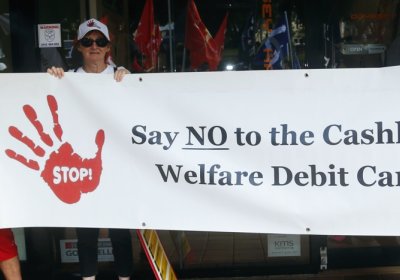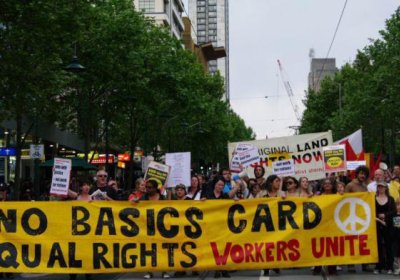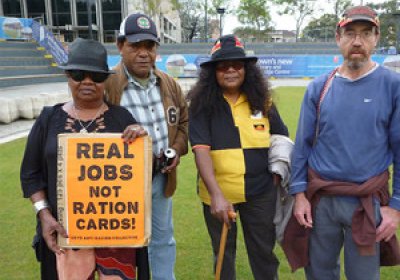Labor has said it will work with local communities “on better local solutions” to the cashless debit card, leaving it a little ambiguous. Alex Bainbridge argues that all income management needs to stop.
income management
The following is a statement issued by participants of the StandUp2017 conference that concluded with a rally in Mbantua (Alice Springs) on June 26.
* * *
Rosalie Kunoth Monks: “You better believe it, when the Intervention first hit in 2007 community councils were decimated.”
Matthew Ryan: “Trying to get the government to listen to us, is like a brick wall.”
More than 100 people attended a heated community meeting in Ceduna, South Australia, on November 7, to hear Assistant Minister for Social Services Alan Tudge discuss the Healthy Welfare Card.
"Another bloody bogan. Shows she can't manage her money", the Coles cashier said as Sally left the store. It was Sally's first time using the Basics Card, and things were not off to a good start.
The Tony Abbott government’s moves to introduce the Healthy Welfare Card – income management on steroids – indicate that it remains committed to a welfare system based on deterrence and punishment.
Last week the federal government released its first evaluation of how its controversial income management policy has fared in five locations where the scheme was introduced in July 2012.
This discriminatory government policy, which allows for Centrelink clients to have their payments quarantined and restricts how they can spend their money, has also been been explored in two recent government reports that have proposed extending the scheme.
Members of the Aboriginal community, faith-based groups, unionists, welfare activists, and others gathered at the State Administration Centre in Adelaide on September 9 to oppose a proposal to expand income management in South Australia.
Labor Premier Jay Weatherill has announced he would “offer the broadest possible support” to all 27 of billionaire Andrew Forrest's recommendations in his Indigenous Employment and Training Review. This would include Forrest's controversial proposal to dramatically expand income management to all working-age Centrelink clients, or 2.5 million people.
Kirstyn Jones is from Davoren Park near Playford in Adelaide's northern suburbs, where there has been an income management trial for two years. She is the first Playford resident forced on to income management to speak publicly.
She was put on income management, despite being financially competent and working part time, solely because she was on Youth Allowance and not living at home.
Adelaide-based welfare campaign group Stop Income Management in Playford released the statement below on October 3.
***
Reports that the Coalition is planning to fund major expansions of Income Management as part of the 2014 Federal Budget are deeply alarming.
Despite six years of income management operating in the Northern Territory, there remains no compelling, solid data that the policy improves the financial-management skills or well-being of welfare recipients.
Compulsory income management of disadvantaged welfare recipients was slammed by speakers at a forum at the Bankstown Arts Centre on April 11.
The forum, organised by the Say No to Government Income Management: Not in Bankstown, Not Anywhere campaign coalition, attracted about 40 people to hear representatives from unions and Aboriginal, migrant and youth groups call for a campaign to stop the extension of income management from July 1 this year.
A protest against racism outside Labor MP Tanya Plibersek's office on March 21 demanded an end to the Northern Territory intervention and its expansion into areas such as Bankstown in south-west Sydney.
Stop the Intervention Collective Sydney (STICS) organised the rally, which highlighted the small but significant steps being taken to bring Aboriginal communities, unions and others together to prevent the spread of these apartheid-like policies.
The protest was held on International Day for the Elimination of Racial Discrimination and national Close the Gap day.








